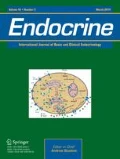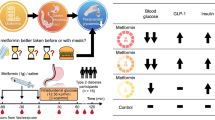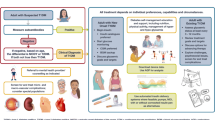Abstract
Aim
The risks of fasting during Ramadan in patients with adrenal insufficiency are unknown. The aims of this study were to evaluate these risks in such patients, to determine the risk factors and finally to set some recommendations.
Methods
It is a cross-sectional study about 180 patients with known and treated adrenal insufficiency. The patients responded to a 14-item questionnaire concerning their knowledge about the disease and fasting during the last month of Ramadan.
Results
There were 132 women and 48 men. The mean age was 47.6 ± 15.0 years (14–79). One hundred and thirty eight patients (76.7 %) were advised by their physician not to fast. Ninety-one patients (50.5 %) tried to fast. Complications occurred in 61 cases (67.0 %): asthenia in 88.5 % of cases, intense thirst in 32.8 %, symptoms of dehydration in 49.2 % and symptoms of hypoglycaemia in 18 %. One patient was hospitalized. Fifty-five patients (60.4 %) were able to fast for the whole month. Age, gender, duration of the disease, its primary origin, associated hypothyroidism, diabetes mellitus, hypertension or diabetes insipidus and daily dose of hydrocortisone did not significantly differ between fasters and non-fasters, full-month-fasters and partial-month-fasters, and fasters with complications and fasters without complications. The frequency of adequate knowledge about the disease was significantly higher in full-month-fasters vs. partial-month-fasters, and in fasters without complications vs. those with complications.
Conclusion
In patients with adrenal insufficiency, fasting can cause complications especially if the level of knowledge about the disease is low.


Similar content being viewed by others
References
I. Salti, E. Bénard, B. Detournay, M. Bianchi-Biscay, C. Le Brigand, C. Voinet, A. Jabbar, EPIDIAR study group A population-based study of diabetes and its characteristics during the fasting month of Ramadan in 13 countries: results of the epidemiology of diabetes and Ramadan 1422/2001 (EPIDIAR) study. Diabetes. Care. 27, 2306–2311 (2004)
M. Al-Arouj, S. Assaad-Khalil, J. Buse et al., Recommendations for Management of Diabetes During Ramadan. Diabetes. Care. 33(8), 1895–1902 (2010)
F. Azizi, H.A. Rasouli, Serum glucose, bilirubin, calcium, phosphorus, protein and albumin concentrations during Ramadan. Med. J. Islam. Repub. Iran. 1, 38–41 (1987)
M.Z. Nomani, M.H. Hallak, S. Nomani, I.P. Siddiqui, Changes in blood urea and glucose and their association with energy containing Nutrients in men on hypocaloric diets during Ramadan fasting. Am. J. Clin. Nutr. 49, 1141–1145 (1989)
E. Bouhlel, M. Denguezli, M. Zaouali, Z. Tabka, R.J. Shephard, Ramadan fastings effect on plasma leptin, adiponectin concentrations, and body composition in trained young men. Int. J. Sport. Nutr. Exerc. Metab. 18, 617–627 (2008)
M. Maislos, N. Khamaysi, A. Assali, Y. Abou-Rabiah, I. Zvili, S. Shany, Marked increase in plasma high-density-lipoprotein cholesterol after prolonged fasting during Ramadan. Am. J. Clin. Nutr. 57, 640–642 (1993)
L. Dewanti, C. Watanabe, Sulistiawati, R. Ohtsuka, Unexpected changes in blood pressure and hematological parameters among fasting and non fasting workers during Ramadan in Indonesia. Eur. J. Clin. Nutr. 60, 877–881 (2006)
F. Samad, F. Qazi, M.B. Pervaiz, D.K. Kella, M. Mansoor, B.Z. Osmani, F. Mir, M.M. Kadir, Effects of Ramadan fasting on blood pressure in normotensive males. J. Ayub. Med. Coll. Abbottabad. 27(2), 338–42 (2015)
I. Salim, J. Al Suwaidi, W. Ghadban, H. Alkilani, A.M. Salam, Impact of religious Ramadan fasting on cardiovascular disease: a systematic review of the literature. Curr. Med. Res. Opin. 29(4), 343–54 (2013)
S.R. Bornstein, M. Breidert, M. Ehrhart-Bornstein, B. Kloos, W.A. Scherbaum, Plasma catecholamines in patients with Addison’s disease. Clin. Endocrinol. 42(2), 215–218 (1995)
M. Shinya, Otsuki Michio, I. Maki, A. Nobuyuki, I. Shuichi, S. Youichi, Y. Toshiki, K. Soji, Reduced epinephrine reserve in response to insulin-induced hypoglycemia in patients with pituitary adenoma. Eur. J. Endocrinol. 157, 265–270 (2007)
J.J. Christiansen, C.B. Djurhuus, C.H. Gravholt, P. Iversen, J.S. Christiansen, O. Schmitz, J. Weeke, J.O.L. Jorgensen, N. Møller, Effects of cortisol on carbohydrate, lipid, and protein Metabolism: studies of acute cortisol withdrawal in adrenocortical Failure. J. Clin. Endocrinol. Metab. 92, 3553–3559 (2007)
G. Meyer, A. Hackemann, J. Reusch, K. Badenhoop, Nocturnal Hypoglycemia Identified by a Continuous Glucose Monitoring System in Patients with Primary Adrenal Insufficiency (Addison’s Disease). Diabetes. Technol. Ther. 14(5), 386–8 (2012)
K.S. Petersen, R.L. Rushworth, P.M. Clifton, D.J. Torpy, Recurrent nocturnal hypoglycaemia as a Cause of morning fatigue in treated Addison’s disease – favourable response to Dietary management: a case report. BMC. Endocr. Disord. 15, 61 (2015)
P. Cambiaso, R. Schiaffini, G. Pontrelli, C. Carducci, G. Ubertini, F. Crea, M. Cappa, Nocturnal hypoglycaemia in ACTH and GH deficient children: role of continuous glucose monitoring. Clin. Endocrinol. 79(2), 232–7 (2013)
M. Debono, R.J. Ross, J. Newell-Price, Inadequacies of glucocorticoid replacement and improvements by physiological circadian therapy. Eur. J. Endocrinol. 160, 719–729 (2009)
R.L. Rushworth, D.J. Torpy, Adrenal insufficiency in Australia: is it possible that the Use of lower dose, short-acting glucocorticoids has increased the risk of Adrenal crises? Horm. Metab. Res. 47(6), 427–432 (2015)
M. Debono, C. Ghobadi, A. Rostami-Hodjegan, H. Huatan, M.J. Campbell, J. Newell-Price, K. Darzy, D.P. Merke, W. Arlt, R.J. Ross, Modified-release hydrocortisone to provide circadian cortisol profiles. J. Clin. Endocrinol. Metab. 94(5), 1548–1554 (2009)
A. Mallappa, M. Debono, Recent Advances in Hydrocortisone Replacement Treatment. Endocr. Dev. 30, 42–53 (2016)
R. Giordano, F. Guaraldi, E. Marinazzo, F. Fumarola, A. Rampino, R. Berardelli, I. Karamouzis, M. Lucchiari, T. Manetta, G. Mengozzi, E. Arvat, E. Ghigo, Improvement of anthropometric and metabolic parameters, and quality of life following treatment with dual-release hydrocortisone in patients with Addison’s disease. Endocrine. 51(2), 360–368 (2016)
G. Johannsson, Improving glucocorticoid replacement in patients with adrenal insufficiency. Endocrine 52(3), 405–407 (2016)
A. Falorni, V. Minarelli, S. Morelli, Therapy of adrenal insufficiency: an update. Endocrine 43(3), 514–528 (2013)
S.R. Bornstein, B. Allolio, W. Arlt, A. Barthel, A. Don-Wauchope, G.D. Hammer, E.S. Husebye, D.P. Merke, H. Murad, C.A. Stratakis, D.J. Torpy, Diagnosis and Treatment of Primary Adrenal Insufficiency: An Endocrine Society Clinical Practice Guideline. J. Clin. Endocrinol. Metab. 101(2), 364–389 (2016)
H. Filipsson, J.P. Monson, M. Koltowska-Häggström, A. Mattsson, G. Johannsson, The impact of glucocorticoid replacement regimens on metabolic outcome and comorbidity in hypopituitary patients. J. Clin. Endocrinol. Metab. 91(10), 3954–3961 (2006)
S. Hahner, M. Loeffler, B. Bleicken, C. Drechsler, D. Milovanovic, M. Fassnacht, M. Ventz, M. Quinkler, B. Allolio, Epidemiology of adrenal crisis in chronic adrenal insufficiency: the need for new prevention strategies. Eur. J. Endocrinol. 162, 597–602 (2010)
S. Hahner, C. Spinnler, M. Fassnacht, S. Burger-Stritt, K. Lang, D. Milovanovic, F. Beuschlein, H.S. Willenberg, M. Quinkler, B. Allolio, High incidence of adrenal crisis in educated patients with chronic adrenal insufficiency: a prospective study. J. Clin. Endocrinol. Metab. 100(2), 407–416 (2015)
S.S. Siddiqi, S.K. Singh, S.A. Khan, O. Ishtiaq, M.F. Pathan, S.A. Raza, A.K.A. Khan, A.H. Zargar, G. Bantwal, Guidelines regarding management of adrenal insufficiency in the Holy month of Ramadan. Indian J. Endocrinol. Metab. 16(4), 519–521 (2012)
Author information
Authors and Affiliations
Corresponding author
Ethics declarations
Conflict of interest
The authors declare that they have no competing interests.
Author Disclosure Statement
The authors have no competitive financial interests to disclose.
Ethical approval
All procedures performed in studies involving human participants were in accordance with the ethical standards of the institutional and/or national research committee and with the 1964 Helsinki declaration and its later amendments or comparable ethical standards. The ethics committee of the hospital approved the study. This article does not contain any studies with animals performed by any of the authors.
Informed consent
Informed consent was obtained from all individual participants included in the study.
Rights and permissions
About this article
Cite this article
Chihaoui, M., Chaker, F., Yazidi, M. et al. Ramadan fasting in patients with adrenal insufficiency. Endocrine 55, 289–295 (2017). https://doi.org/10.1007/s12020-016-1186-0
Received:
Accepted:
Published:
Issue Date:
DOI: https://doi.org/10.1007/s12020-016-1186-0




